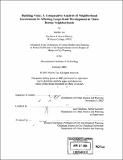| dc.contributor.advisor | Karl Seidman. | en_US |
| dc.contributor.author | Tai, Martha, 1973- | en_US |
| dc.contributor.other | Massachusetts Institute of Technology. Dept. of Urban Studies and Planning. | en_US |
| dc.coverage.spatial | n-us-ma | en_US |
| dc.date.accessioned | 2005-09-26T19:53:31Z | |
| dc.date.available | 2005-09-26T19:53:31Z | |
| dc.date.copyright | 2004 | en_US |
| dc.date.issued | 2004 | en_US |
| dc.identifier.uri | http://hdl.handle.net/1721.1/28342 | |
| dc.description | Thesis (M.C.P.)--Massachusetts Institute of Technology, Dept. of Urban Studies and Planning, 2004. | en_US |
| dc.description | Includes bibliographical references (p. 108-109). | en_US |
| dc.description.abstract | (cont.) In particular, neighborhood divisions not only prevent the collective interests of the neighborhood from being addressed but can also enable the city to put aside neighborhood interests in favor of maintaining the interests of the greater public. In addition, the thrust of a neighborhood's effort to effectuate project changes must be channeled through its advisory power to successfully convince and persuade the Boston Redevelopment Authority (BRA) and developer. Furthermore, the level of institutional support that a neighborhood group garners can fluctuate according to the degree of neighborhood unity conveyed. Lastly, recommendations are presented to inform Boston neighborhoods of ways in which they can strengthen their influence as they continue to tackle large projects proposed in their boundaries. | en_US |
| dc.description.abstract | This thesis compares the outcome of three Boston neighborhood groups' efforts to effectuate project changes to three specific large-scale development proposals in their neighborhoods. Specifically, the experiences of Fight Liberty Place (FLP) in opposing Liberty Place in Chinatown, Old Dover Neighborhood Association (ODNA) in shaping Dover Residences in the South End, and the Battery Wharf Working Group (BWWG) in affecting Battery Wharf in the North End were examined. A neighborhood's ability to influence project changes was found to be a function of internal neighborhood unity in and institutional support for the neighborhood. Institutional support is used to mean support from city representatives who can exert influence in the development approval process and make a concerted effort to work with a neighborhood to either implement project changes or withhold approval of a project in response to neighborhood demands. Based on the findings of the three cases, it has been surmised that changes in design and off-site mitigation can be more easily secured than changes in dimensions, use, and affordable housing. The experiences of the three neighborhood groups also highlight tactical considerations that neighborhoods should bear in mind when proceeding with a strategy against a development. | en_US |
| dc.description.statementofresponsibility | by Martha Tai. | en_US |
| dc.format.extent | 109 p. | en_US |
| dc.format.extent | 8582941 bytes | |
| dc.format.extent | 8596185 bytes | |
| dc.format.mimetype | application/pdf | |
| dc.format.mimetype | application/pdf | |
| dc.language.iso | en_US | |
| dc.publisher | Massachusetts Institute of Technology | en_US |
| dc.rights | M.I.T. theses are protected by copyright. They may be viewed from this source for any purpose, but reproduction or distribution in any format is prohibited without written permission. See provided URL for inquiries about permission. | en_US |
| dc.rights.uri | http://dspace.mit.edu/handle/1721.1/7582 | |
| dc.subject | Urban Studies and Planning. | en_US |
| dc.title | Building voices : a comparative analysis of neighborhood involvement in affecting large-scale development in three Boston neighborhoods | en_US |
| dc.title.alternative | Comparative analysis of neighborhood involvement in affecting large-scale development in three Boston neighborhoods | en_US |
| dc.type | Thesis | en_US |
| dc.description.degree | M.C.P. | en_US |
| dc.contributor.department | Massachusetts Institute of Technology. Department of Urban Studies and Planning | |
| dc.identifier.oclc | 55694654 | en_US |
